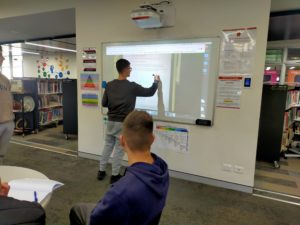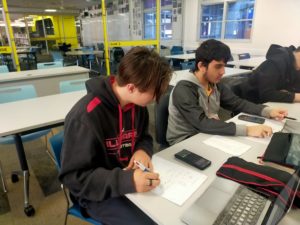Goal Setting
This week during Pastoral Care time, students in Years 7-11 commenced formulating their Semester 2 goals. Students reflected on the Semester 1 goals and then formulated Learning and Wellbeing Goals for this semester. Students in Years 10 and 11 were also asked to nominate a career aspiration.
Students in Year 12 will be formulating short term goals in the lead up to their HSC Trial Examinations. Following the HSC Trial Examinations, they will set goals and strategies based on their examinations results.
All parents at the College have been sent an email providing instructions on how to access their son’s goals and related strategies. Take time to speak with your son about the goals that he has set and the strategies that he will implement to help achieve these. Ask your son what has he done to date to achieve his goals. In quoting Phil Britten, “never leave goal setting without taking some action toward its attainment. You must take immediate action”.
Tips For Overcoming Procrastination
The following information on procrastination has been adapted from the Study Study Skills Handbook in the Study Samurai Library. Procrastination is the act of putting off a task which you know you have to do, even though you know that putting it off will probably be worse for you in the long run. For example, when you procrastinate about starting an assignment it doesn’t make the assignment go away, or the deadline change, it just gives you less time to get the work done. To manage this, try the following:
- Become aware of the excuses you use – make a mental note when you procrastinate. What excuses do you give yourself? Too tired? Too difficult? Too boring? Being aware is the first step in changing your behaviour. Keep yourself honest by asking questions like “is this the best use of my time at the moment?”
- Reduce or eliminate distractions – creating a clear, uncluttered work environment which is free from distractions will help you avoid procrastinating. Turn off your social media or WiFi, turn off your music or TV, close the door.
- Make a prioritised list – before you start work (or procrastinating) take a few minutes to work out what your priorities for the session are, based on your deadlines. Take into account all the time you have available and make a prioritised list. Work on the most important thing first.
- Break down projects into chunks – if you have a big task that you have to do, or something that you really don’t want to start, have a think about how it can be broken up into smaller parts.
- Just start – stop focusing on getting it done perfectly, or even well, just make a start, even if it’s just for a few minutes. Starting the task makes you realise it’s not as daunting as you originally thought and allows you to make a small amount of progress which encourages you to keep going.
- Reward yourself – set yourself a small goal (to do with the task you are procrastinating about) and then reward yourself appropriately when you complete it. For example, write an outline for your essay and then have afternoon tea.
- “Twofer Concept” – when you are working on a difficult task, break it up by having a more interesting or easy task that you work on in the same study block.
- Create routines – establishing a routine can help you avoid procrastination as you get into the rhythm of working for a set time each day at a set time of the day.
- Find a study buddy – perhaps starting that difficult work will be easier if you have someone to work with. This could be a school friend or a sibling.
- Schedule in breaks – breaks give you time to think and process information that you have been working on and give you an opportunity to do the things you really enjoy.
Academic Assembly
Congratulations to the Year 7-10 students who received awards at this week’s Academic Assemblies. Awards were presented to students who have demonstrated consistent effort to all aspects of study, students in the top 5% of a course and first place in each course. In addition, students who achieved excellent Grades across all courses were presented with the Academic Excellence awards. We encourage all our students to believe in their potential, and to understand that with persistence and effort, they can achieve their goals. All students can aspire and work towards being presented with an award at future Academic Assembles.
Study Samurai Library
All families have access to the Study Samurai Library. The Study Samurai Library includes the Study Skills Module website which provides advice and resources on developing essential skills for academic success. To access the Study Samurai Library website, go to www.studysamurailibrary.com and login with these details:
Username: edmundrice
Password: 13achieve
This week, families are able to spend time reviewing the Study Skills module: Your Brain and Memory. Click here to access the resources.
Please do not hesitate to make contact if you have any questions.
Maths Workshop in the Holidays
Following are photos of Year 11 students who attended a Mathematics Advanced Workshop during the school holidays. Students demonstrated a number of skills in the way they collaborated together to solve problems and then communicated their thinking and reasoning to other students by presenting the solutions.
Mr Gerry Sozio
Director of Learning & Teaching

















